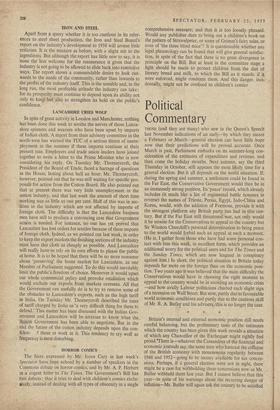LANCASHIRE CRIES WOLF
In spite of great activity in London and Manchester, nothing has been done this week to soothe the nerves of those Lanca- shire spinners and weavers who have been upset by imports of Indian cloth. A report from their advisory committee in the north-west has warned' the TUC of a serious threat of unem- ployment in the summer if these imports continue at their present rate. Employers and trade union leaders have joined together to write a letter to the Prime Minister who is now considering his reply. On Tuesday Mr. Thorneycroft, the President of the Board of Trade, faced a barrage of questions in the House, lasting about half an hour. Mr. Thorneycroft, however, pointed out that he was still waiting for specific pro- posals for action from the Cotton Board. He also pointed out that at present there was very little unemployment in the cotton industry, and that last week the amount of short time working was as little as one per cent. Half of this was in sec- tions in the industry which are not affected by imports of foreign cloth. The difficulty is that the Lancashire business men have still to produce a convincing case that Government action is needed. For instance, no one has yet proved that Lancashire has lost orders for textiles because of these imports of foreign cloth. Indeed, as we pointed out last week, in order to keep the export markets the finishing sections of the industry must have this cloth as cheaply as possible. And Lancashire will really have to rely on its own efforts to please the public at home. It is to be hoped that there will be no more nonsense about 'preserving' the home market for Lancashire, as one Member of Parliament suggested. To do this would inevitably limit the public's freedom of choice. Moreover it would upset our whole commercial policy and provoke retaliation which would exclude our exports from markets overseas. All that the Government can usefully do is to try to remove some of the obstacles to Lancashire's exports, such as the high tariff in India. On Tuesday' Mr. Thorneycroft described the rates of tariff charged by India as"a very difficult thing for them to defend.' This matter has been discussed with the Indian Gov- ernment and Lancashire will be anxious to know what the British Government has been able to negotiate. But in the end the future of the cotton industry depends upon the con- fident ,f those at work in it. This tendency to cry wolf so frequently is most disturbing.










































 Previous page
Previous page